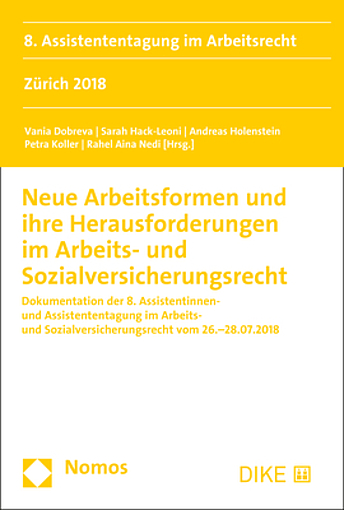englischLegislation is lagging behind technical and social developments in the labour market, which is posing new problems in both labour law and social security law. To work full time for only one employer is no longer the norm. However, social security schemes and worker protection regulations are often designed for this model. Furthermore, the change in the world of work towards digitalisation, flexibility and a number of employers or contract providers being on platforms such as Uber, Mechanical Turk etc. means that the existing legal foundations no longer do justice to all employment relationships. The new forms of employment are a challenge for both scholars and practitioners of law. The contributions in this volume, complied from the proceedings at the 8th Research Assistants’ Conference on the Labour and Social Security Laws, which took place in Zurich from 26th to 28th July 2018, are dedicated to these topics.
With contributions by
Thomas Dullinger, Antje G. I. Tölle, Mathis Böttcher, Michael E. Meier, Christian Haidn, Pauline Kuhn, Katja Chandna-Hoppe, Daniela Krömer, Jan Armin Gärtner, Daniel Holler.
Die Gesetzgebung hinkt den technischen und gesellschaftlichen Entwicklungen auf dem Arbeitsmarkt hinterher, was sowohl im Arbeitsrecht als auch im Sozialversicherungsrecht neue Probleme aufwirft. Es entspricht nicht mehr durchgehend der Norm, bei nur einem Arbeitgeber während vieler Jahre in vollem Pensum beschäftigt zu sein. Die Sozialversicherungen und die Vorschriften zum Arbeitnehmerschutz sind jedoch häufig für dieses Modell konzipiert. Weiter führt der Wandel in der Arbeitswelt hin zu Digitalisierung, Flexibilisierung, Mehrzahl von Arbeitgebern oder Auftragsanbietern auf Plattformen wie Uber, Mechanical Turk etc. dazu, dass die rechtlichen Grundlagen nicht mehr allen Arbeitsverhältnissen gerecht werden. Die neu entstandenen Arbeitsformen führen zu vielen Herausforderungen in Lehre und Praxis. Diesen widmen sich die Beiträge dieses Tagungsbands zur 8. Assistent/-innentagung im Arbeits- und Sozialversicherungsrecht vom 26. bis zum 28. Juli 2018 in Zürich.
Mit Beiträgen von
Thomas Dullinger, Antje G. I. Tölle, Mathis Böttcher, Michael E. Meier, Christian Haidn, Pauline Kuhn, Katja Chandna-Hoppe, Daniela Krömer, Jan Armin Gärtner, Daniel Holler.


